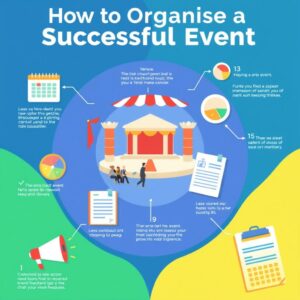How to Organise a Successful Event
I. Planning & Preparation
1. Define Objectives & Target Audience
– Identify the purpose of the event (e.g., fundraising, networking, education).
– Understand who the event is intended for to tailor the content and approach.
2. Set a Budget & Timeline
– Create a comprehensive budget detailing all expenses (venue, catering, marketing).
– Establish a timeline with key milestones to ensure timely execution of tasks.
3. Choose Venue & Date
– Select a venue that accommodates your expected number of attendees and aligns with your event’s theme.
– Pick a date that does not conflict with major events or holidays that may affect attendance.
II. Logistics & Coordination
1. Event Marketing & Promotion
– Develop a marketing strategy that includes social media, email campaigns, and partnerships to promote the event.
– Create engaging content to draw interest and ensure consistent messaging across all platforms.
2. Vendor Management (Catering, Entertainment)
– Research and select vendors that fit within your budget and meet your needs (caterers, speakers, performers).
– Negotiate contracts and confirm details to ensure a smooth collaboration.
3. Registration & Ticketing
– Choose a user-friendly platform for ticket sales and registrations.
– Monitor ticket sales and track participant numbers to anticipate guest needs on the day of the event.
III. On-the-Day Execution
1. On-site Staff & Volunteers
– Assign specific roles and responsibilities to staff and volunteers to ensure smooth operation.
– Conduct a briefing session to clarify tasks and provide all necessary event information.
2. Attendee Experience & Engagement
– Create an environment that fosters engagement (interactive sessions, networking opportunities).
– Ensure that attendees have access to resources and support throughout the event.
3. Contingency Planning
– Prepare for potential issues (e.g., technical difficulties, bad weather) by having backup plans in place.
– Communicate clearly with your team to respond promptly to any problems that arise.
IV. Post-Event Activities
1. Feedback Collection & Analysis
– Distribute surveys to gather attendee feedback on various aspects of the event (content, speakers, logistics).
– Analyze the collected data to identify strengths and areas for improvement.
2. Follow-up Communication
– Send thank-you emails to attendees, sponsors, and speakers to express appreciation.
– Share highlights, photos, and outcomes of the event to maintain engagement.
3. Evaluation & Reporting
– Review the entire event process against the original objectives to evaluate success.
– Prepare a comprehensive report that includes insights, lessons learned, and recommendations for future events.
By following these structured steps, you can increase the likelihood of a successful event that meets its objectives and leaves a lasting positive impression on attendees.












